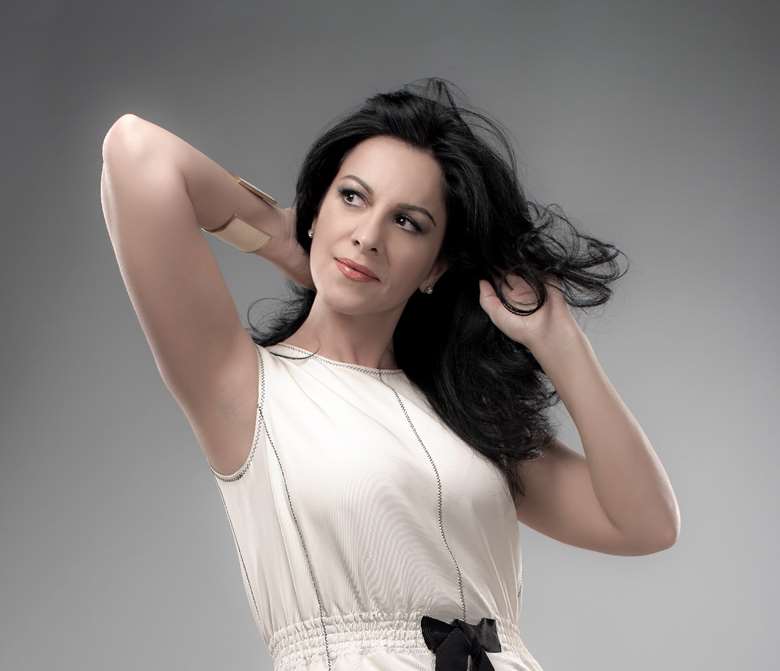A centenary and a world premiere: Soprano Angela Gheorghiu’s latest release is her tribute to Puccini
Jon Tolansky
Thursday, December 7, 2023
Gheorghiu discusses her new album, A Te, Puccini, with Jon Tolansky, offering a glimpse into 17 rare songs for Signum Classics

‘Questo germe primo / di Bohème’ – ‘This first seed of La bohème.’ Puccini wrote those words on a manuscript – but not a manuscript sketch for his great opera La bohème. In 1906, ten years after the opera had premiered, he donated to his friend, composer Paolo Tosti, the original manuscript of a song he had written back in 1888 called Sole e amore (Sun and Love). The song was what we might today call a ‘stand-alone’: an art song – in Italian called a romanza – for solo singer and piano accompaniment that was not connected to any opera. However, in Sole e amore is a passage that almost note for note anticipates the quartet from the closing scene in Act 3 of La bohème as Rodolfo and Mimi wistfully part as lovers while in complete contrast Marcello and Musetta are having a rowdy quarrel.
Quite a number of the songs that Puccini composed for solo voice have similarly striking anticipations of melodies that he was later to write in some of his most famous operatic scenes. The contexts in the operas were nearly always different, but their reappearances were not coincidental – Puccini consciously quoted passages from songs he had written while he was in the process of composing Le villi, Edgar, Manon Lescaut, La bohème, La rondine, and Gianni Schicchi. Unsurprisingly, most of the songs are immediately recognisable as the inimitable musical expression of Puccini, and most remarkable of all is how this was the case with early ones that were written even before his first opera Le villi appeared in 1884. One of those, Melanconia (Melancholy), was only recently rediscovered, and as short a time ago as in February 2023 received its first ever performance, a whole 140 years after it had been composed.
"Puccini’s later great operatic tragedies help us to face our own tragedies and go on ahead with our lives"
There was a thrilling frisson for the audience in Lucca when acclaimed virtuoso soprano Angela Gheorghiu brought this romanza to the ears of the public for its debut and, three months later there was an electrifying atmosphere in the recording studio when Gheorghiu, accompanied by the distinguished pianist Vincenzo Scalera, included it as a world premiere among 17 Puccini songs she has set down on an album for Signum Classics. In the year when the 100th anniversary of the composer’s death is being commemorated, the album is Angela Gheorghiu’s personal tribute to Giacomo Puccini, as she explains: ‘I have given this CD the title A te, Puccini, both as it is my tribute to Puccini – “To you, Puccini” – and because it gives us a direct link to the name of his very first song A te – “To you” – which he composed when he was just 16 years old. About halfway through this very early work the music already becomes unmistakably the style of Puccini – and how significant that already as a teenager he chose to set a poem about a lover just wanting a kiss in order to forget everything!’


Indeed, much of the subject matter of even Puccini’s earliest songs remarkably foreshadow the composer of the great famous operas that were later to come, and especially it is the compellingly individualistic musical treatment of the words that is distinctly Puccini’s. An ideal example of this is in fact Melanconia which is one of four settings of poems by Antonio Ghislanzoni that Puccini wrote in 1883. It was used again by the composer the following year for a love duet in Le Villi, and Gheorghiu comments that, ‘In it we see how the young Puccini was already so aware of darkness and sadness, but importantly in a cathartic way, forerunning how in his later great operatic tragedies he helps us to face our own tragedies and go on ahead with our lives.’
"How significant that already as a teenager Puccini chose to set a poem about a lover just wanting a kiss in order to forget everything!"
Writing about the four Ghislanzoni songs in his Master Musicians biography of the composer, Puccini scholar Julian Budden said: ‘Evident in these Ghislanzoni settings is an unusual concern for expressive and dynamic nuance, almost as if the composer intended each to be acted as well as sung – a foretaste of that integration of word, note, and gesture which is as fundamental to Puccini’s conception of opera as it is to Wagner’s.’
So it is with the lion’s share of the songs on the new album A te, Puccini from Signum, in which 17 of the composer’s romanzas are sung by an artist who has been so especially highly acclaimed for her inspired realisation of precisely those extremely demanding to perform elements in Puccini that Julian Budden identifies. Signum Classics are giving us an invaluable opportunity to hear most of the composer’s rarely heard songs shine forth with the artistry and virtuosity of one of the most masterly singers of our time.
Georgiu’s A te, Puccini, commemorating the 100th anniversary of Puccini’s death, is due for release on Signum Classics on 26 January 2024. Pre-orders for the album are available here.
